Related Research Articles
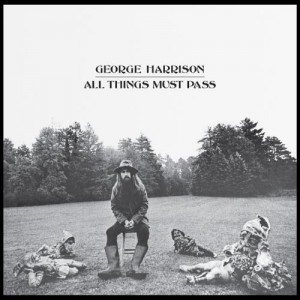
All Things Must Pass is the third studio album by English rock musician George Harrison. Released as a triple album in November 1970, it was Harrison's first solo work after the break-up of the Beatles in April that year. It includes the hit singles "My Sweet Lord" and "What Is Life", as well as songs such as "Isn't It a Pity" and the title track that had been overlooked for inclusion on releases by the Beatles. The album reflects the influence of Harrison's musical activities with artists such as Bob Dylan, the Band, Delaney & Bonnie and Friends and Billy Preston during 1968–70, and his growth as an artist beyond his supporting role to former bandmates John Lennon and Paul McCartney. All Things Must Pass introduced Harrison's signature slide guitar sound and the spiritual themes present throughout his subsequent solo work. The original vinyl release consisted of two LPs of songs and a third disc of informal jams titled Apple Jam. Several commentators interpret Barry Feinstein's album cover photo, showing Harrison surrounded by four garden gnomes, as a statement on his independence from the Beatles.
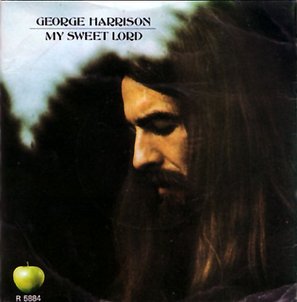
"My Sweet Lord" is a song by English musician George Harrison, released in November 1970 on his triple album All Things Must Pass. It was also released as a single, Harrison's first as a solo artist, and topped charts worldwide; it was the biggest-selling single of 1971 in the UK. In America and Britain, the song was the first number-one single by an ex-Beatle. Harrison originally gave the song to his fellow Apple Records artist Billy Preston to record; this version, which Harrison co-produced, appeared on Preston's Encouraging Words album in September 1970.

"Instant Karma!" is a song by English rock musician John Lennon, released as a single on Apple Records in February 1970. The lyrics focus on a concept in which the consequences of one's actions are immediate rather than borne out over a lifetime. The single was credited to "Lennon/Ono with the Plastic Ono Band", apart from in the US, where the credit was "John Ono Lennon". The song reached the top five in the British and American charts, competing with the Beatles' "Let It Be" in the US, where it became the first solo single by a member of the band to sell a million copies.
"All Things Must Pass" is a song by English rock musician George Harrison, issued in November 1970 as the title track to his triple album of the same name. Billy Preston released the song originally – as "All Things (Must) Pass" – on his Apple Records album Encouraging Words (1970) after the Beatles had rehearsed the song in January 1969 but did not include it on their Let It Be album. The composition reflects the influence of the Band's sound and communal music-making on Harrison, after he had spent time with the group in Woodstock, New York, in late 1968. In his lyrics, Harrison drew inspiration from Timothy Leary's poem "All Things Pass", a psychedelic adaptation of the Tao Te Ching.
"I'm the Greatest" is a song written by English musician John Lennon that was released as the opening track of the 1973 album Ringo by Ringo Starr. With Starr, Lennon and George Harrison appearing on the track, it marks the only time that three former Beatles recorded together between the band's break-up in 1970 and Lennon's death in 1980. Lennon wrote the song in December 1970 as a wry comment on his rise to fame, and later tailored the lyrics for Starr to sing. Named after one of Muhammad Ali's catchphrases, the song partly evokes the stage-show concept of the Beatles' 1967 album Sgt. Pepper's Lonely Hearts Club Band.

Encouraging Words is the fifth studio album by American soul musician Billy Preston, released in September 1970 on Apple Records. It was the last of Preston's two albums for the Beatles' Apple label, after which he moved to A&M Records. The album was co-produced by George Harrison and Preston. Harrison's songs "All Things Must Pass" and "My Sweet Lord" were issued here for the first time, two months before his own recordings appeared on his triple album All Things Must Pass.
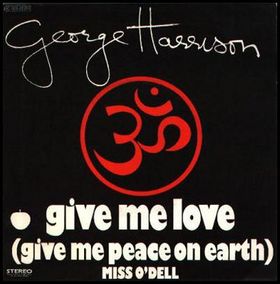
"Give Me Love (Give Me Peace on Earth)" is a song by English musician George Harrison, released as the opening track of his 1973 album Living in the Material World. It was also issued as the album's lead single, in May that year, and became Harrison's second US number 1, after "My Sweet Lord". In doing so, the song pushed Paul McCartney and Wings' "My Love" from the top of the Billboard Hot 100, marking the only occasion that two former Beatles have held the top two chart positions in America. The single also reached the top ten in Britain, Canada, Australia, and Holland.
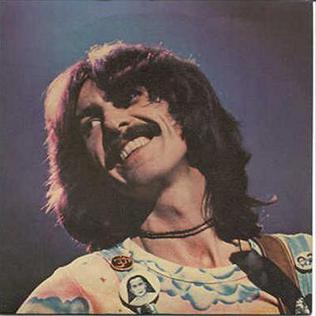
"You" is a song by English musician George Harrison, released as the opening track of his 1975 album Extra Texture . It was also the album's lead single, becoming a top 20 hit in America and reaching number 9 in Canada. A 45-second instrumental portion of the song, titled "A Bit More of You", appears on Extra Texture also, opening side two of the original LP format. Harrison wrote "You" in 1970 as a song for Ronnie Spector, formerly of the Ronettes, and wife of Harrison's All Things Must Pass co-producer Phil Spector. The composition reflects Harrison's admiration for 1960s American soul/R&B, particularly Motown.
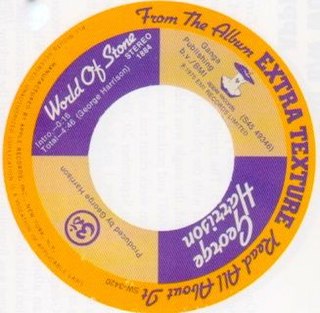
"World of Stone" is a song by English rock musician George Harrison, released in 1975 on Extra Texture , his final album for Apple Records. It was also issued as the B-side of the album's lead single, "You". Harrison wrote the song in 1973 but recorded it two years later, following the unfavourable critical reception afforded his 1974 North American tour with Ravi Shankar and the Dark Horse album. Due to its context on release, commentators view "World of Stone" as a plea from Harrison for tolerance from these detractors. According to some of his biographers, the lyrics reflect Harrison's doubts regarding his devotion to a spiritual path – an apparent crisis of faith that followed his often-unwelcome spiritual pronouncements during the tour, and which permeated his work throughout 1975.
"Awaiting on You All" is a song by English musician George Harrison, released on his 1970 triple album, All Things Must Pass. Along with the single "My Sweet Lord", it is among the more overtly religious compositions on All Things Must Pass, and the recording typifies co-producer Phil Spector's influence on the album, due to his liberal use of reverberation and other Wall of Sound production techniques. Harrison recorded the track in London backed by musicians such as Eric Clapton, Bobby Whitlock, Klaus Voormann, Jim Gordon and Jim Price – many of whom he had toured with, as Delaney & Bonnie and Friends, in December 1969, while still officially a member of the Beatles. Musically, the composition reflects Harrison's embracing of the gospel music genre, following his production of fellow Apple Records artists Billy Preston and Doris Troy.
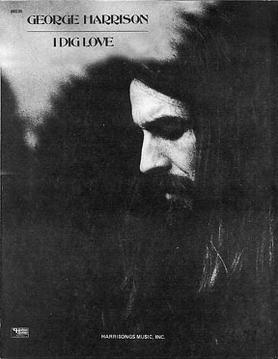
"I Dig Love" is a song by English rock musician George Harrison from his 1970 triple album All Things Must Pass. A paean to free love, it marks a departure from the more profound, spiritually oriented subject matter of much of that album. Musically, the song reflects Harrison's early experimentation with slide guitar, a technique that he was introduced to while touring with Delaney & Bonnie and Friends in December 1969.
"Hear Me Lord" is a song by English rock musician George Harrison from his 1970 triple album All Things Must Pass. It was the last track on side four of the original LP format and is generally viewed as the closing song on the album, disc three being the largely instrumental Apple Jam. Harrison wrote "Hear Me Lord" in January 1969 while still a member of the Beatles, who rehearsed it briefly at Twickenham Film Studios that month, but passed it over for inclusion on what became their final album, Let It Be.

"Deep Blue" is a song by English rock musician George Harrison that was released as the B-side to his 1971 charity single "Bangla Desh". Harrison wrote the song in 1970, midway through the recording sessions for All Things Must Pass, and recorded it in Los Angeles the following year while organising the Concert for Bangladesh. The composition was inspired by the deteriorating condition of his mother, Louise, before she succumbed to cancer in July 1970, and by Harrison's feelings of helplessness as he visited her in hospital in the north of England. Given the subject matter, "Deep Blue" also served to convey the suffering endured by the millions of refugees from war-torn Bangladesh in 1971, as sickness and disease became widespread among their makeshift camps in northern India.

"Māya Love" is a song by English musician George Harrison, released on his 1974 album Dark Horse. The song originated as a slide guitar tune, to which Harrison later added lyrics relating to the illusory nature of love – maya being a Sanskrit term for "illusion", or "that which is not". Harrison's biographers consider the lyrical theme to be reflective of his failed marriage to Pattie Boyd, who left him for his friend Eric Clapton shortly before the words were written. Harrison recorded the song at his home, Friar Park, on the eve of his North American tour with Ravi Shankar, which took place in November and December 1974. The recording features Harrison's slide guitar extensively and contributions from four musicians who formed the nucleus of his tour band: Billy Preston, Tom Scott, Willie Weeks and Andy Newmark. Reviewers note the track as an example of its parent album's more diverse musical genres, namely funk and rhythm and blues, compared with the more traditional rock orientation of Harrison's earlier solo work.
"It Is 'He' " is a song by English musician George Harrison, released as the final track of his 1974 album Dark Horse. Harrison was inspired to write the song while in the Hindu holy city of Vrindavan, in northern India, with his friend Ravi Shankar. The composition originated on a day that Harrison describes in his autobiography as "my most fantastic experience", during which his party and their ascetic guide toured the city's temples. The song's choruses were adapted from the Sanskrit chant they sang before visiting Seva Kunj, a park dedicated to Krishna's childhood. The same pilgrimage to India led to Harrison staging Shankar's Music Festival from India in September 1974 and undertaking a joint North American tour with Shankar at the end of that year.
"You and Me (Babe)" is a song by English musician Ringo Starr, released as the final track on his 1973 album Ringo. Starr's fellow ex-Beatle George Harrison wrote the song along with Mal Evans, the Beatles' longtime aide and a personal assistant to Starr during the making of Ringo. The track serves as a farewell from Starr to his audience in the manner of a show-closing finale, by lyrically referring to the completion of the album. During the extended fadeout, Starr delivers a spoken message in which he thanks the musicians and studio personnel who helped with the recording of Ringo – among them, Harrison, John Lennon and Paul McCartney, and his producer, Richard Perry.

"Apple Scruffs" is a song by English rock musician George Harrison from his 1970 triple album All Things Must Pass. He wrote it as a tribute to the die-hard Beatles fans known as Apple scruffs, who used to wait outside the Apple Corps building and other London locations for a glimpse of the band members. This tradition continued after the group's break-up in April 1970, as the scruffs were a regular presence outside the studios where Harrison recorded his album. The song was also issued on the album's second single, as the B-side to "What Is Life".

Doris Troy is an album released in 1970 on the Beatles' Apple Records label by American soul singer Doris Troy. It features songs written by Troy and a number of the participants on the sessions, including George Harrison, Stephen Stills, Klaus Voormann and Ringo Starr. Through the extended period of recording, the album became an all-star collaborative effort, typical of many Apple projects during 1968–70, although it was Troy's only album on the Beatles' label. Other guest musicians included Billy Preston, Peter Frampton, Leon Russell, Eric Clapton and members of the Delaney & Bonnie Friends band. Like the Harrison-produced single "Ain't That Cute", Doris Troy failed to chart in Britain or America on release.

"That's the Way God Planned It" is a song by American musician Billy Preston and the title track to his 1969 album of the same name. Issued as a single, the song was Preston's first release on the Beatles' Apple record label, following his guest role on the band's "Get Back" single. The lyrics to "That's the Way God Planned It" partly reflect the long musical apprenticeship Preston had served since childhood, mentored by artists such as Sam Cooke and Ray Charles, while musically the track combines the gospel tradition with rock. Produced by George Harrison in London, the recording also features contributions from Eric Clapton, Keith Richards, Ginger Baker and Doris Troy. Having been edited down to three minutes for its single release, the full version appeared on the album, as "That's the Way God Planned It ".

"All That I've Got (I'm Gonna Give It to You)" is a song by American soul musician Billy Preston that was released in January 1970 as his third single on Apple Records. It was written by Preston and his fellow Apple artist Doris Troy and produced by George Harrison. In the United States, the single missed the Billboard Hot 100 chart, peaking at number 108. According to Harrison, the song was Preston's musical response to criticism that he had abandoned his black soul roots by embracing rock music.
References
- 1 2 3 4 5 6 Davis, Andy (2010). Encouraging Words (CD booklet). Billy Preston. Apple Records.
- ↑ Inglis, Ian (2010). The Words and Music of George Harrison. Santa Barbara, CA: Praeger. p. 21. ISBN 978-0-313-37532-3.
- ↑ Sulpy, Doug; Schweighardt, Ray (1997). Get Back: The Unauthorized Chronicle of The Beatles' Let It Be Disaster. New York, NY: St. Martin's Griffin. p. 55. ISBN 0-312-19981-3.
- ↑ Unterberger, Richie (2006). The Unreleased Beatles: Music & Film. San Francisco, CA: Backbeat Books. p. 238. ISBN 978-0-87930-892-6.
- ↑ Spizer, Bruce (2005). The Beatles Solo on Apple Records. New Orleans, LA: 498 Productions. p. 225. ISBN 0-9662649-5-9.
- ↑ Winn, John C. (2009). That Magic Feeling: The Beatles' Recorded Legacy, Volume Two, 1966–1970. New York, NY: Three Rivers Press. p. 244. ISBN 978-0-307-45239-9.
- ↑ Doggett, Peter (2011). You Never Give Me Your Money: The Beatles After the Breakup. New York, NY: It Books. p. 63. ISBN 978-0-06-177418-8.
- ↑ Rodriguez, Robert (2010). Fab Four FAQ 2.0: The Beatles' Solo Years, 1970–1980. Milwaukee, WI: Backbeat Books. p. 72. ISBN 978-1-4165-9093-4.
- ↑ Winn 2009, p. 283.
- ↑ Leng, Simon (2006). While My Guitar Gently Weeps: The Music of George Harrison. Milwaukee, WI: Hal Leonard. p. 71. ISBN 978-1-4234-0609-9.
- ↑ Castleman, Harry; Podrazik, Walter J. (1976). All Together Now: The First Complete Beatles Discography 1961–1975. New York, NY: Ballantine Books. p. 91. ISBN 0-345-25680-8.
- ↑ Spizer 2005, pp. 225, 340.
- ↑ Castleman & Podrazik 1976, pp. 91–92.
- ↑ Leng 2006, p. 62.
- ↑ Doggett 2011, p. 139.
- ↑ Doggett, Peter (1993). Encouraging Words (CD booklet). Billy Preston. Apple Records. p. 5.
- 1 2 Leng 2006, p. 319.
- ↑ Frontani, Michael (2009). "The Solo Years". In Womack, Kenneth (ed.). The Cambridge Companion to the Beatles. Cambridge, UK: Cambridge University Press. p. 158. ISBN 978-0-521-68976-2.
- ↑ Inglis 2010, p. 162.
- ↑ Leng 2006, p. 71.
- ↑ Eder, Bruce. "Billy Preston Encouraging Words". AllMusic . Retrieved July 24, 2018.